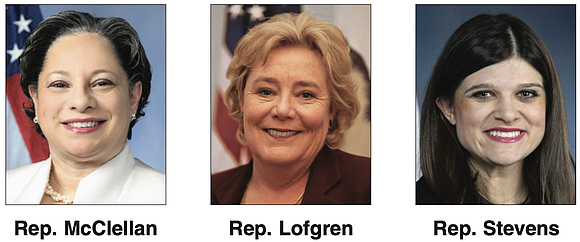Increasing opportunities for underrepresented minorities in STEM
12/21/2023, 6 p.m.
On Dec. 15, House Science, Space and Technology (SST) Committee Member, Virginia Congresswoman Jennifer McClellan; SST Ranking Member, California Congresswoman Zoe Lofgren; and Ranking Member of the SST Subcommittee and Technology, Michigan Congresswoman Haley Stevens sent the following letter Comptroller General Gene Dodaro, asking the Government Accountability Office to study the financial instability of graduate and postdoctoral STEM scholars.
Graduate students and postdoctoral scholars play an important role in the United States science, technology, engineering, and mathematics (STEM) research and development enterprise.
The recruitment, training, and retention of these early-career researchers are essential to fulfilling the potential of the CHIPS and Science Act (Public Law No: 117-167) and ensuring that the United States remains the global leader in science and technology. However, increases in costs and personal expenses needed to pursue a STEM career have led to unsustainable levels of financial instability for some researchers.
For example, according to data from the National Science Foundation’s Survey of Earned Doctorates, the median reported education-related debt of science and engineering doctorate recipients was $35,000 in 2022. Further intertwined with the financial instability issues are discrepancies in the stipends and benefits offered to graduate students and postdoctoral scholars, especially across demographic groups, research disciplines, and the issuing federal agency.
Broadly, these lead to many concerns, including the uncertain financial return-of-investment for graduate education and inadequate support for the researchers and their dependents during their training phase. These challenges are further corroborated by data from the Survey of Earned Doctorates, which reported that only 67% of science and engineering doctorate recipients had a definite post graduation commitment consisting of new employment, a postdoctoral study position, or a return to predoctoral employment.
Although there are additional stakeholders that financially support graduate students and postdoctoral researchers, not least the institutions themselves, federal agencies play an important role in establishing an expectation of what is considered a fair, equitable, and sufficient wage with corresponding in-kind benefits for graduate students and postdoctoral scholars. As we strive to make STEM fields more accessible to participants from diverse backgrounds, it will be necessary to understand the extent to which underrepresented groups may be adversely and differentially impacted by the financial strain of seeking advanced STEM training.
Due to the importance of STEM professionals to our nation’s health, economy, and well-being, and due to the long and resource-intensive training period these researchers must undertake, it is vital for us to understand the factors that may affect entry into and completion of such training. Therefore, we ask the Government Accountability Office to study what is known about financial instability among graduate students and postdoctoral scholars and assess the extent to which federal support for STEM research and training addresses financial instability. To the extent practicable, the study should address:
•What is known about the prevalence and amount of federal research and training assistance awards among graduate students and postdoctoral scholars, and what impact does the availability of such awards have on participation by underrepresented groups?
•How do different funding models, such as traineeships, fellowships, research assistantships, or teaching assistantships, vary in the amount of stipend, benefits, or career development opportunities offered to graduate students and postdoctoral scholars?
•Are there opportunities for federal agencies to provide more consistent support for both personal and professional expenses encountered by trainees, such as health care, housing, childcare, travel, or publishing?
•Are there any federal research agencies or agency programs that have set minimal standards for what is considered an acceptable living wage and benefits?
•To what extent do characteristics of agencies’ assistance awards such as stipend amounts, salaries, and benefits vary — including for underrepresented groups — and how do agencies determine recommended award amounts?
a. Is there any existing interagency coordination or other mechanism to create consistency across agencies?
•How have agency assistance award amounts changed over time, and how do they compare to changes in inflation, cost of living, geographic location, and other costs, as appropriate?
•What is known about challenges faced by institutions of higher education in recruiting and retaining graduate students and postdoctoral researchers due to stipend levels or benefits?
•To what extent are graduate students and postdoctoral researchers in selected STEM fields eligible for federal food, housing, or medical assistance, and to what extent are these programs utilized?
•What is known about how offered status, benefits, protections, and rights-as-employees vary among institutions for graduate students and postdoctoral scholars? Are there any policies, such as those from institutional, state, locality, or funding source, that can significantly affect what is offered?
•To what extent do federal statistical agencies or selected research funding agencies have data characterizing the financial stability of these groups that may be useful to inform policy action?
•What opportunities are there for federal policies, programs, or activities that research agencies can undertake to help promote the financial stability of graduate students and postdoctoral
researchers?
Thank you for your prompt attention to this request. Please contact Albert Hinman or Dahlia Sokolov of the Committee’s Minority staff at (202) 225-6375 and Melody Tan of Rep. McClellan’s staff at (202) 225-6365 for any questions.







